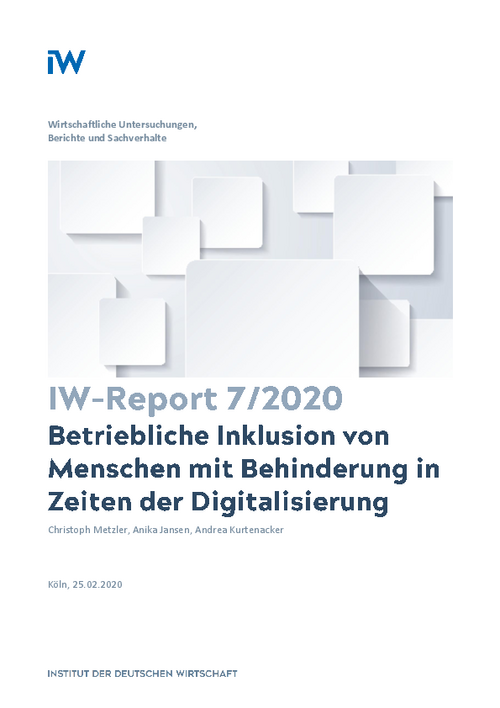Digitization has a positive influence on the inclusion of people with disabilities in German companies. Companies that already rely heavily on digitization today employ more people with disabilities than companies that currently do not have any reference to digitization.

Inclusion of People with Disabilities within Enterprises in Times of Digitization
IW-Report

Digitization has a positive influence on the inclusion of people with disabilities in German companies. Companies that already rely heavily on digitization today employ more people with disabilities than companies that currently do not have any reference to digitization.
Almost 30 percent of all companies also see new opportunities for the employment of people with disabilities through digitization. What is striking is that companies that are already relying heavily on digitization are more optimistic about this than companies without any reference to digitization.
Digitization is already making everyday work easier for people with disabilities. In particular, mobile devices for location-independent working, such as notebooks, and online communication services for exchanging information within a team, such as WhatsApp, are seen as a great relief by company representatives. 20 percent of all companies use digital technologies to support people with disabilities in their everyday work.
People with disabilities can be found in all industries and company sizes. In almost 35 percent of all companies surveyed, at least one employee had a physical disability. People with a learning disability were represented in 27 percent of the companies surveyed. 7 percent of the companies employed people with a mental disability. Across all forms of disability, large companies employ people with disabilities more frequently than small and medium-sized enterprises.
Information makes it easier for companies to employ people with disabilities. However, only just under 60 percent of all companies with experience in employing people with disabilities are sufficiently informed about disabled-friendly work design, such as assistive devices. Even only 45 percent state that they have sufficient information for recruiting new employees with disabilities. Digital portals such as www.kofa.de and www.rehadat.de may help companies.

Christoph Metzler / Anika Jansen / Andrea Kurtenacker: Betriebliche Inklusion von Menschen mit Behinderung in Zeiten der Digitalisierung
IW-Report

More on the topic

What factors influence the career ambitions of people with disabilities?
Many companies in Germany report having difficulties not only in recruiting employees, but also in filling vacant management positions.
IW
Working with Long COVID: Impacts and Options for Work Arrangements
A SARS-CoV-2 infection can have long-term health consequences, a phenomenon commonly known as Long COVID, which often affect individuals of working age.
IW